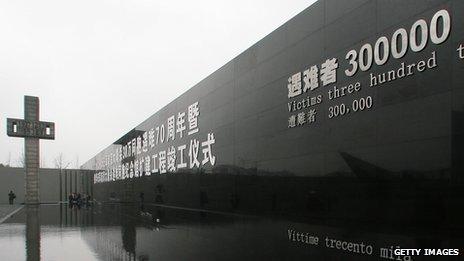Governor of Japan broadcaster NHK denies Nanjing massacre
- Published

China says up to 300,000 died in Nanjing at the hands of Japan's military
A governor of Japan's public broadcaster, NHK, has denied that the Nanjing massacre took place, days after a row over Tokyo's use of war-time sex slaves engulfed the new NHK chief.
Naoki Hyakuta made his comments as he campaigned for a right-wing candidate in the Tokyo gubernatorial election.
Mr Hyakuta, a prominent novelist, is one of 12 members of the NHK board of governors.
He was picked by Prime Minister Shinzo Abe for the role late last year.
"In 1938, Chiang Kai-shek tried to publicise Japan's responsibility for the Nanking Massacre, but the nations of the world ignored him. Why? Because it never happened," the Asahi newspaper quoted Mr Hyakuta as saying, external.
Atrocities were committed by all sides in wars and that there was no need to teach such things to Japanese children, he said.
His comments came in a stump speech on Tokyo on 3 February, the paper said.
Asked about the reports, Japan's top government spokesman declined to comment.
"I'm aware of the reports, but I've learnt (expressing personal views) doesn't violate the Broadcast Law," Yoshihide Suga said.
The law bans the governors from serving as officers in political parties but not from being members, and their political activities are otherwise not restricted.
Mr Hyakuta's comments come days after the broadcaster's new head, Katsuto Momii, said that the Japanese military's use of sex slaves during World War Two was a practice common in any country at war.
"Such women could be found in any nation that was at war, including France and Germany," he said, describing international anger as "puzzling".
But he later apologised, saying: "It is my lack of discretion in that I didn't understand the various rules. I think it was very inappropriate that I made the comments at such places."
China says up to 300,000 civilians and soldiers died in Nanjing over the winter of 1937-38 after the Japanese military entered the city. Some Japanese historians dispute these figures.
- Published27 January 2014
- Published26 January 2014
- Published29 May 2013
- Published14 May 2013
- Published27 June 2013
- Published26 December 2013